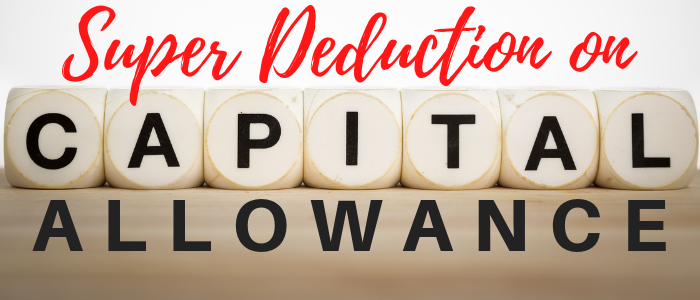What is Super Deduction On Capital Allowances?
During the pandemic period, a few new allowances were introduced in the UK. The aim was to boost the recovery of the business and its activities. One of those newly introduced allowances is the Super Deduction relief.
The super deduction enables businesses to invest in qualified, allowance-eligible assets; receiving a much higher tax reduction in the tax year of purchase than it would otherwise. This allowance is applied for the investment made between the period of- 1st April 2021 to 31st March 2023.
Regardless, not all businesses qualify for the super deduction scheme. The super deduction encompasses all the plant and machinery that are by default eligible for the writing down allowances of the typical 18% main pool rate.
Things to know about Super Deduction
One should be aware of the following information regarding the two-year tax-break incentive offered by the UK government.
- What is the purpose of this super deduction allowance?
The Covid-19 pandemic impacted the UK economy negatively, and several types of investments were put on hold despite the support offered by the government.
The purpose of introducing this two-year incentive scheme is to encourage firms to invest in plants and machinery assets during this crucial time, which will eventually help increase the business’s productivity and enhance its growth.
By far, this super deduction is known to be the most attractive tax incentive offered by the UK government in order to promote economic expansion in the country.
- Which type of plant and machinery is eligible for the super deduction allowances?
As mentioned above, according to the HMRC, all new assets under the capital allowance of 18% main pool rate are qualified for the super deduction incentive.
This includes:
- Refrigerator units
- Solar panels
- Desk and chairs for office purposes
- Compressor unit
- Servers and other computer equipment accessories.
- Cranes and drills
- Vehicles such as vans, lorries or tractors
- Charging point for the electrical vehicles.
- What happens during the period of selling these claimed assets?
It is mandatory to track the assets with claimed allowances so that when they are disposed of, they can be given the right tax treatment.
If you are selling off the main pool rate item, then it is required for you to pay a balancing charge. This is the 50% tax on the sales profits. And, if you are selling the asset after the 1st of April 2023; then a rate of 25% corporation tax will be applied to the balancing charge.
- What are the excluded items which are not qualified for the 130% super deduction?
- Used and second-hand items
- Cars
- Investments and shares
- Leased plants and machinery
- Residential property
- Long-life asset expenditure
The above are the excluded items from the super deduction incentive. However, it is ideal to seek professional advice before making a decision and checking the eligibility of an item for the super deduction relief scheme.
Moving ahead, let us see how the super deduction works and how to check how much you can claim.
How does the super-deduction work?
In the super-deduction tax incentive, your business can claim back 25p for every pound invested in the qualified assets for the allowance; for two years from the 1st of April 2021.
Suppose say, your accounting period ends before the 1st of April 2023, then the rate for super deduction is 130%.
And, if it ends on or after that, then you need to follow these steps to know what you can claim:
- Count the number of days in the accounting period before the 1st of April 2023
- Divide that count by the total number of days in an accounting period
- Multiply the answer by 30
- To get the relevant percentage, add 100 to the answer
- Use the relevant percentage to multiply the qualifying expenditure to gain your super deduction
Having a brief idea of the super deduction, the next most important question is;
Is my business eligible for the super-deduction?
The tax incentive does not qualify sole traders, LLPs or partnerships to entertain the tax relief. So if your business is a corporation or a limited company, then, yes! It is eligible for the super deduction.



